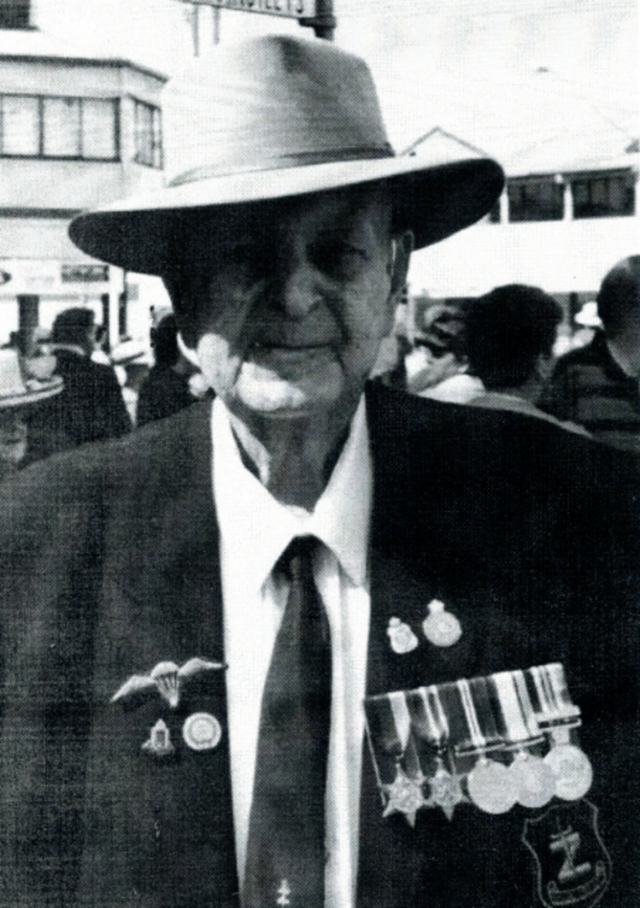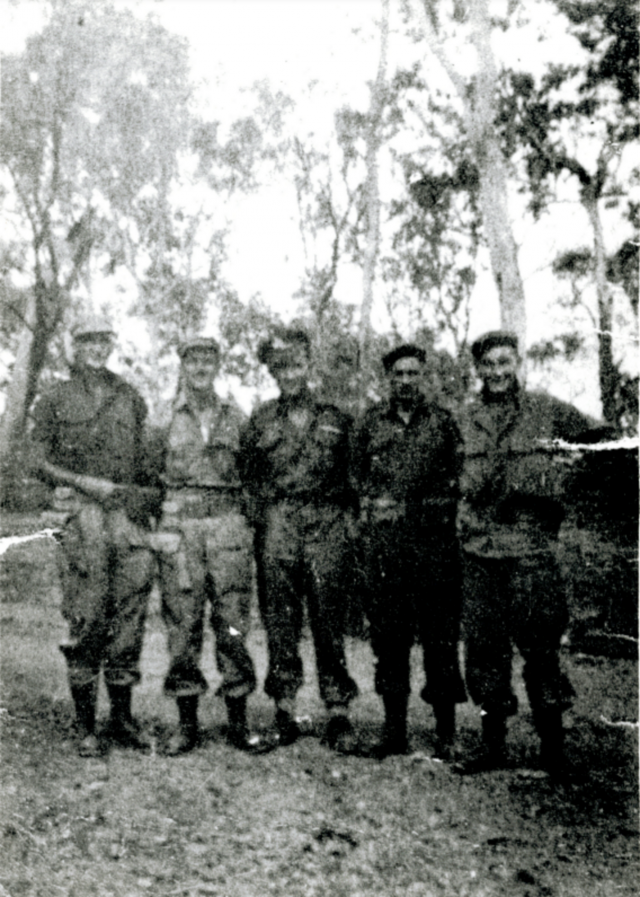By John Telfer
Parachute jumping is a rather hazardous exercise, but parachuting at night into an unknown landing zone in a hostile country takes a considerable amount of courage and this is what faced Sergeant Jack White in June 1943. As a member of an Australian Independent Company better known as “Z” Force Special Unit, Jack was inserted by parachute into Timor to carry out surveillance work and to capture a prisoner for interrogation. Over the next two years Jack has an incredible story of survival that was held secret because of top secret security reasons. Here is Jack’s story taken from his personal diary and notes provided by his very proud family.
Jack was born in Warwick on 17th August 1921. He was the fourth of six children of Mervil and Olive White, and apart from his army service, spent his entire life in Warwick. Jack was educated at Warwick East State School and Warwick High School where he represented the Queensland schoolboys in hockey and began a sporting career that became a full- time obsession on leaving school after his senior year in 1939. He became a qualified accountant while being employed by T.W. Porter and Company, and up and until December 1943, he was selected to play hockey for the Queensland senior team and was a top sportsman in rugby, tennis and golf. With Australia now threatened by war with Japan, Jack, enlisted in the Australian Army in Brisbane on 6th December, 1943, but not before he married his sweetheart, Beryl Mogridge on 24th January, 1944, and eventually they would raise four children in Lindsay Jon, Elizabeth and Stephen. In fact, Beryl was pregnant with Lindsay when the news of Jack being missing in action was passed on to her by the army authorities. This left Beryl with the trauma of not knowing whether Jack was dead or alive.
Once in the army, they were calling for volunteers to undergo specialist training with an Australian Army Independent Company, and so Jack enlisted into this unit completely unaware of its secrecy. Its better- known name was “Z” Force, which was a special commando unit formed during World War 2 to operate behind enemy lines. Training was to include parachute, intelligence gathering, explosives, unarmed combat, and conducting guerrilla warfare with the native populations of the region. Training bases for this special group were at Wilson’s Promontory in Victoria, Fraser Island in Queensland and Darwin.
Jack was to experience highly dangerous operations from 1943 to 1945 at places in New Guinea, Sumba, Borneo, the Sabu Islands and Timor. Many of these were classified as top secret, but Jack’s notes did mention a couple of operations. On 23rd June 1945, when a party of four were selected to parachute into Timor at night, on landing, they hid their parachutes and stores containing their weapons and a month’s supply of food rations. After a few days of skirmishes with Japanese troops and hiding in the surrounding hills they returned to their hidden stores to find that they had been discovered and taken; possibly by natives friendly to the Japanese. In one major skirmish on July on July 5th, Jack’s leader, Lieutenant Williams, was killed in this action and Jack received a bullet wound to his shoulder. He, and his two other members of the party, Sergeants Shand and Curran, were taken prisoner.
As the end of the war was near, Jack and his two mates began a worrying journey towards repatriation from July to September 1945, when under guard by Japanese military police. The three prisoners were transported across Timor to Dili for interrogation, and later moved to the outskirts of Dili to a Japanese prison. On September 1st with the Japanese surrender on 15th August, they began their journey from Dili to the island of Flores. From here, they were sent to Soembawa, Probalinngo, Java and Denpasar, mainly by Jap motor transport. Arriving in Bali on October 2nd by an RAAF C46, they reached Singapore and moved to a camp near the Changi prison. He mentioned the political turmoil that took place in the major towns of Java with Sukarno’s Nationalist movement taking over from the Japanese military rule before the Dutch arrived back. Jack suffered painfully with his shoulder wound which Japanese medical doctors treated, before boarding the hospital ship “Manunda” bound for home in the latter months of 1945.
It was at home that Jack finally received specialist treatment for his shoulder wound where a Japanese bullet had entered his neck and because of the bullet’s close proximity to the spine, army surgeons decided to leave the bullet in and hopefully extract it sometime later. (In fact, the bullet worked its own way down Jack’s back and came out many years later, and is now mounted and displayed at the Southern Downs Ex-Services’ Association Museum, at Tooth Street, Warwick.)
While convalescing at Charters Towers Military Hospital and Selheim Convalescent Depot in Queensland, Jack made an excellent recovery and once his shoulder was well enough, Jack was back into his beloved sport and represented the Army Northern Command against the Navy, RAAF and American Air Corps in tennis, hockey and soccer in inter-service matches. Now fully recovered from his wartime experiences, Jack was discharged from the army on 6th December, 1945.
Now back in Warwick, he resumed a much quieter life than his last three years and resumed his pre-war occupation as an accountant, and of course, his sporting career. Jack was not greatly hindered by his shoulder injury, and represented Queensland in hockey in 1948 and again in 1949, and was on line to represent Australia at the 1952 Helsinki Olympics, but cost and his accounting business prevented him from achieving that goal. Retiring from hockey in the early 1950’s, Jack took up golf and eventually won the Warwick Golf Club Championships in 1954, a title also won by his father in 1935. As age took its toll, Jack resumed tennis again socially, and was a foundation member of the Warwick Gun Club and Shooters Club. He was quite a marksman having gained a “Minute-Man” badge, which was awarded for being able to place 10 shots in a one -inch circle at 100 yards.
Jack was very community conscious, and was always available to help anyone or any cause and was very generous with his time and expertise in accounting, by helping sporting and social clubs by doing their annual audits without charge. Jack finally retired in December 1999, owing to ongoing health problems possibly brought on by his time in Timor and the very hazardous occupation as a “Z” Force Commando. Jack had often said he could not disclose much of his war-time experiences as most of his work was classified as Top Secret, and admits that even he was unaware of each mission, such was the high security involved.
Jack Russel White’s health failed him on 3st October 2002 and he now lies at rest in the Warwick cemetery in the shade of a large gum tree. No one would argue that Jack was a truly modest man who had a full and extremely courageous life both in his military career and sporting pursuits. It is hard to believe that he once had a price on his head in Timor where the Japanese saw these Australian “Z” Force men as high quality “silent” soldiers, and it is a privilege to write his short story and perhaps remember him as a true Anzac, and a silent warrior in the spirit of all these brave men of “Z” Force who gave their lives in World War 2 and neve home.








